#egusi seeds
Text
EGUSI SOUP|EGUSI SOUP RECIPE |FUFU|NIGERIAN FOOD|AFRICAN FOOD|EGUSI SOUP...
#youtube#nigerianfood#foodlover#mukbang#cooking#cook#africa#food#foodie#nigeria#egusi seeds#egusisoup#fufu
0 notes
Photo

Salad Crunchies Seed Medley
Give your soups, salads, yogurt, and avocado toast a crunchy, nutritional boost with this easy medley of roasted seeds. They're a healthy yummy snack as well. 1/4 cup tri-colored quinoa rinsed and dried, 1/4 teaspoon freshly ground multicolored peppercorns, 1/2 cup raw egusi, 1/2 teaspoon fine sea salt, 1 cup raw sunflower seeds, 1 cup pepitas, 1/2 cup flax seeds, 1/4 cup chia seeds, 1/4 cup white sesame seeds, 1/2 teaspoon cayenne pepper, 1/8 cup amaranth seeds, 1/8 cup black sesame seeds, 2 tablespoons olive oil
0 notes
Photo

Salad Crunchies Seed Medley Recipe
Give your soups, salads, yogurt, and avocado toast a crunchy, nutritional boost with this easy medley of roasted seeds. They're a healthy yummy snack as well.
0 notes
Text

Vegan Palaver Sauce (Ghanaian Spinach and Tomato Stew) with Melon Seed ‘Dumplings’, Boiled Plantains, and Avocado
#vegan#lunch#dinner#Ghanaian cuisine#west african cuisine#stews#palaver sauce#spinach#tomatoes#ginger#garlic#chili#onion#tomato sauce#egusi#melon seeds#plantains#avocado#palm oil#sea salt
19 notes
·
View notes
Photo

Egusi Soup
Egusi soup, a West African seafood stew, is a flavorful dish of cubed beef and shrimp cooked with spinach and ground seeds in a spicy tomato base.
0 notes
Text



















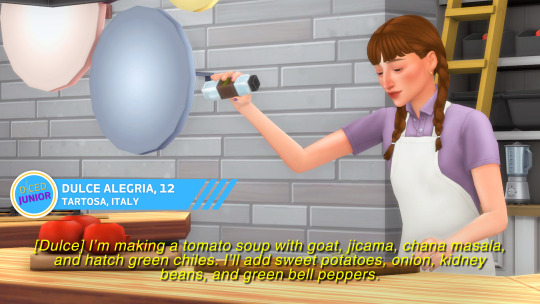









The entree round begins! Who will cook the best dish? Who will cook the better soup? Find out... not in the next segment.
Previous / Next (Transcript under the cut)
(1.) [Mia] Somebody here did not fully follow the rules of Diced Junior.
(2.) [Carlo] And that would still be Lewis! A producer pointed out to us that Lewis here did not use the vegetables that were in the flatbread. We didn't even notice since the flatbread was so burnt.
(3.) [Lewis] Oh, I was supposed to use EVERYTHING from each basket ingredient? Anyway, thank you for the opportunity, judges.
(4.) [Mia] Thank you, Lewis. Please audition for Diced once you're older. We'd love to see you compete again.
(5.) [Lewis] Well, I already came to terms with being eliminated before they announced it. Maybe I will try Diced someday.
(6.) [Dulce] Bye, Lewis!!
[Alex] You did good, man.
[Rubiya] We'll miss you.
[Lewis] Bye, everyone. Good luck.
(7.) N/A
(8.) N/A
(9.) [Andrea] Chefs, please report back to your stations. Your baskets for the entree round have been placed.
(10.) [Dulce] Wow, they move fast here.
(11.) [Andrea] Inside your baskets, you'll find jicama, hatch green chiles...
(12.) [Andrea] ...goat chops, and chana masala.
(13.) [Rubiya] I'm pleasantly surprised with these ingredients! They won't be hard to combine. However, the real challenge here will be the time limit while using these complex items.
(14.) [Dulce] Yes! My mom is Mexican, so I am very familiar with jicama and chiles. Also, my mom's friend taught me how to cook some Indian dishes, so I know how to work with masalas. I haven't cooked goat yet, but I should be able to figure it out.
(15.) [Alex] I'm happy with the ingredients, just a lil worried about the chiles. Good thing I've cooked goat lotsa times by now.
(16.) [Andrea] Chefs, the 30-minute timer starts now!
(17.) [Rubiya] I'm making chana masala goat tacos with a green chile salsa and jicama dip.
(18.) [Rubiya] Tacos aren't necessarily easy to make, but with my thirty-minute time limit and these beautiful ingredients, this is the way to go! I'll incorporate the ingredients well. If only I could make the tortillas from scratch, but it is what it is.
(19.) [Dulce] I'm making a tomato soup with goat, jicama, chana masala, and hatch green chiles. I'll add sweet potatoes, onion, kidney beans, and green bell peppers.
(20.) [Dulce] There's a lot of things to dice and chop while also making sure the goat and sweet potatoes are thoroughly cooked, but I want to push myself. Also, the judges seemed to really like how I play with many different ingredients, so I want to do that again.
(21.) [Alex] I'm making an egusi soup with cubed goat meat, hatch green chiles, spiralized jicama, and chana masala. My other ingredients are tomatoes, onions, and spinach.
(22.) [Alex] Well, there aren't any egusi seeds here, so I have to use pumpkin seeds instead. I'll keep the name though, it sounds fancier that way.
(23.) N/A
(24.) [Andrea] Judges, any thoughts and opinions so far?
(25.) [Sofia] We love how confident these young contestants are.
[Mia] However, we also noticed how Alex and Dulce are both making soups. Unfortunately, that will make our judging harsher because we are going to have to compare the two.
(26.) [Carlo] Tsk, tsk. They should have thought more outside the box. Also, Dulce really has to watch the time. Andrea, please check on the contestants.
[Andrea] Will do, Carlo!
#alegria legacy#tjolc gen 1#tjolc#matchalovertrait#dulce alegria#lewis mack#rubiya jabal#alex marino#andrea mixon#mia d'angelo ramirez#sofia bjergsen#carlo mancini#sims 4#ts4#sims 4 legacy#sorry guys for this weird reversal plot twist lol#also hello somewhat consistent/decent lighting 😍😍 i've been waiting for you this entire episode#those tacos sound so good btw omg (disclaimer: i didn't think of those ingredients myself. but i did come up with the dishes)#also the judges are gonna taste all the dishes in one post (it won't drag on like last time) but that won't be until after the next post#next post might be of some interest tho 👀 idk you'll see
56 notes
·
View notes
Text

AFANG - Tripe Stew from West Africa
Without any iota of doubt, soups are a big part of the African cuisine, in fact, it is wise to say that African soups are the main attraction of cuisine in the continent.
African soups can be made with a combination of vegetables and ingredients that are native to the countries where they are most eaten.
Very many African soups are usually eaten with other food staples such as rice, fufu, banku, sadza, garri, pounded yam, and so on.
Below are some of our favorite soups from different African countries.
1. Okra soup
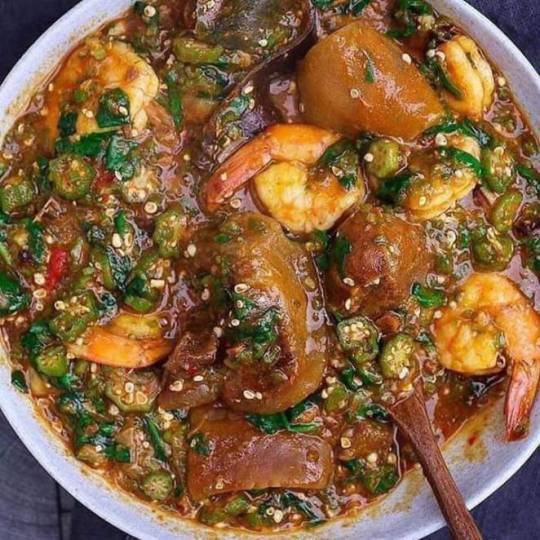
Okra soup is a popular west African dish with okra as its main ingredient. Although this deliciously slimy dish can be cooked with the local palm oil, it is also a good choice for people who are wary of adding oil to their soups.
2. Abenkwan
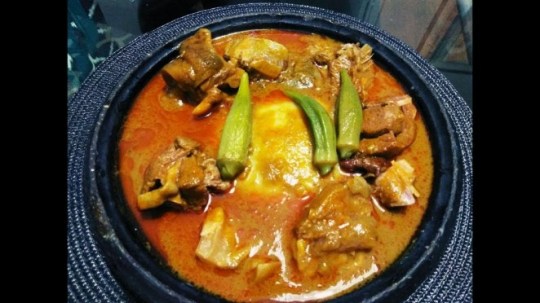
Abenkwan is a Ghanaian soup made from the nuts of the palm tree. The pulp is extracted from the palm fruits and cooked in combination with spices and preferred meat of choice.
Abenkwan has an earthy flavor thanks to the addition of the palm fruit pulp (which is different from the palm oil). Serve warm with rice balls or Kokonte and you will be satisfied to the moons and back.
3. Muriwo na Nyama
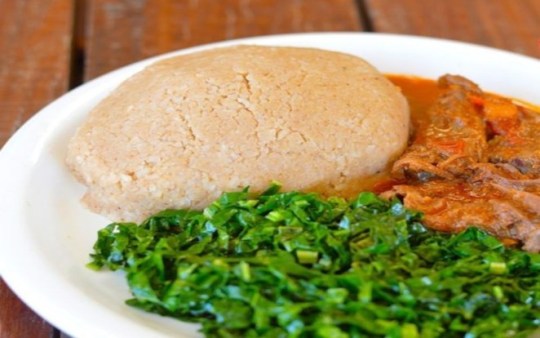
Muriwo na nyama is also known as leafy-beefy or high fields stew. It is native to Zimbabwe, highly nutritious and cn be eaten with sadza.
4. Pepper soup
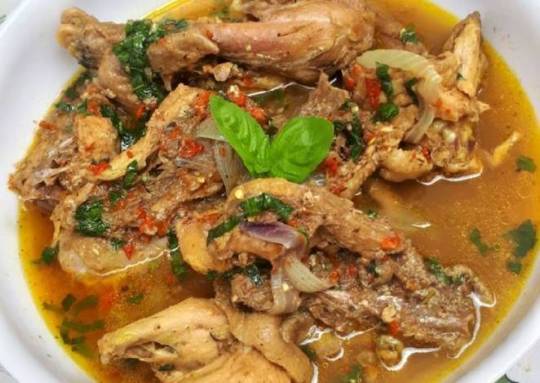
Pepper soup is a spicy African soup that will make your taste buds tingle with excitement. The soup is gotten from the stock of the meat or fish used. It is also spiced with local ingredients, giving it a tantalizing aroma and taste that will make you hungry even if you just had dinner.
For the best experience, have your pepper soup hot–not scalding hot of course– and thank us later.
5. Agushie/Egusi soup

Agushie (Ghana)/Egusi(Nigeria) is a delicious soup cooked with shelled melon seeds. The method of preparation might differ across the different regions in which this soup is eaten but it ultimately includes the addition of leafy greens, seasoning and palm oil. In Nigeria, its best served with freshly pounded yam.
6. Domoda

Domoda is the Gambia’s national dish, second only to Yassa. It is a yummy soup cooked with unsweetened peanut butter. It might also contain sweet potatoes. Domoda is better enjoyed with rice.
7. Afang
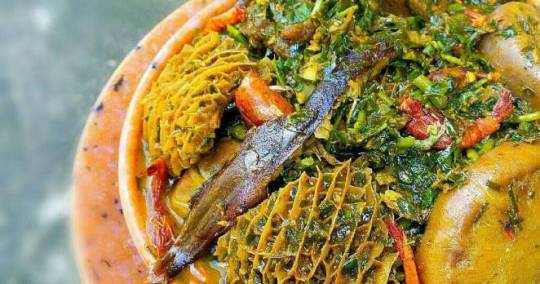
Afang is a delightful and satisfying soup from southern Nigeria. It is similar to the eru soup in Cameroon. They both make use of the afang/okazi leaves. However, the afang leaves are pounded and used in addition to water leaf. Afang soup is rich in deliciousness and best served hot with fufu and lots of meat.
8. Ndole
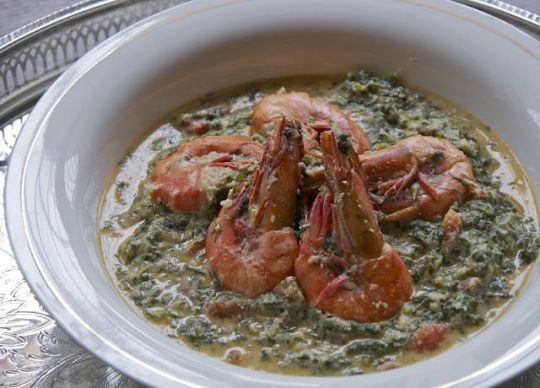
Ndole is another leafy vegetable soup with its home in Cameroon. It is often considered the national dish of the central African country. It’s a creamy and nutritious soup cooked with pureed peanuts and bitter leaf.
9. Afia efere/Ofe nsala
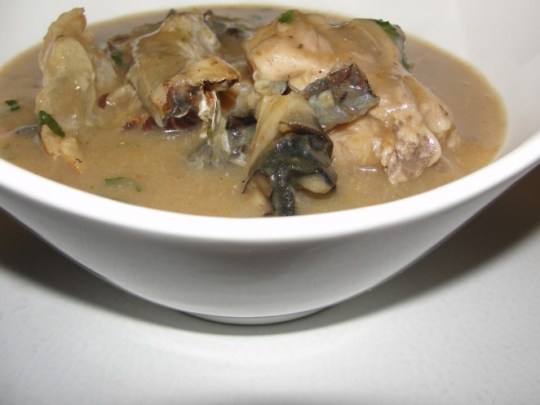
In the Nigerian local languages of Annang and Igbo, afia efere and ofe nsala respectively mean ‘white soup’ in English. Technically, this mouth-watering spicy soup should be called ‘brown soup’ but where’s the fun in that? It is apparently called ‘white’ for the lack of palm oil use.
10. Ewedu Soup
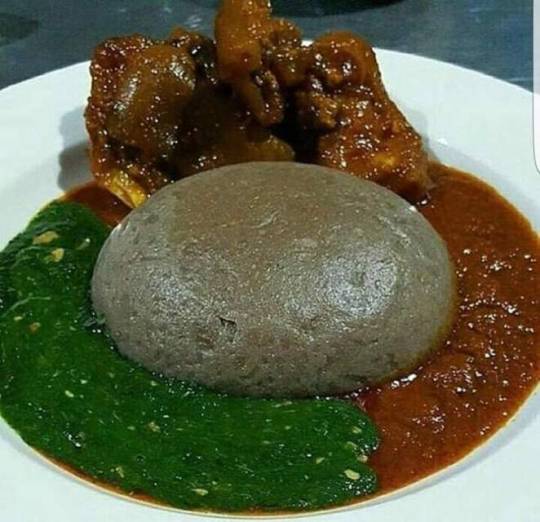
Ewedu is a Nigerian soup which is popular among the Yorubas. It’s a leafy vegetable soup but unlike other African soups, the greens (jute leaves) are pureed and cooked with nothing more than salt, locust beans and often potash.
It is usually served in addition to peppered stews (as pictured above) or gbegiri (beans soup). Yorubas love to eat this with amala, a starchy swallow made from yam peels and sometimes plantains.
#west african food#cooking#african food#stews#soups#main dish#african#Top 10 Delicious African Soups That Will Make You Salivate And Where They Are Best Made
35 notes
·
View notes
Note
egusi pls?
Also what's egusi?
Here's your outfit!



Egusi is a type of seed that is used a lot in west African, predominantly Nigerian, cooking! It can be ground up and put in a soup called Egusi soup, which I loveeee
5 notes
·
View notes
Photo

My #wife makes this #Nigerian dish called #EgusiSoup. This was my first time to taste it. The brown pudding is called Amala. There were two types of egusi here, one with #spinach. It’s made from a melon seed and it is delicious! I’m not a fan of the amala but thankfully she prepares two other options: #fufu and #poundedyam. I’m hooked. I could eat this every day. (at Queens, New York) https://www.instagram.com/p/Cm-kUSFsLSd/?igshid=NGJjMDIxMWI=
8 notes
·
View notes
Text
Experience the Rich Flavors of Ade's Catering
Welcome to Ade's Catering, where we bring the vibrant and diverse tastes of Nigerian and African cuisine to your table. As a premier provider of Nigerian takeaway, we offer a delightful array of traditional dishes that capture the essence of West African culinary traditions. Whether you’re looking for a convenient meal to enjoy at home or planning a special event, Ade's Catering is your go-to destination for authentic and delectable African fare. Our Nigerian restaurant and catering services are designed to deliver an unforgettable dining experience, filled with rich flavors and cultural authenticity.
Discover Our Nigerian Takeaway Services
At Ade's Catering, we understand that sometimes you crave the comforting and flavorful dishes of Nigerian cuisine without the hassle of dining out. That’s why our Nigerian takeaway service is tailored to provide you with the convenience of enjoying your favorite meals at home. From savory stews and spicy jollof rice to tender grilled meats and fresh salads, our takeaway menu features a wide variety of dishes that reflect the rich culinary heritage of Nigeria.
Our commitment to quality means that every takeaway order is prepared with the freshest ingredients and traditional cooking techniques. Whether you’re in the mood for a hearty bowl of egusi soup, a plate of spicy suya, or a refreshing serving of moi moi, you can count on Ade's Catering to deliver delicious and satisfying meals right to your door. Our takeaway service is designed to make it easy for you to enjoy the authentic flavors of Nigeria without compromising on quality or taste.
Immerse Yourself in Our African Restaurant Experience
For those who prefer to savor their meals in a warm and inviting atmosphere, Ade's Catering also operates as a vibrant African restaurant. Our restaurant offers a welcoming environment where guests can enjoy a true taste of Africa. From the moment you step through our doors, you’ll be greeted with the enticing aromas and colorful presentation of our dishes.
Our menu features a diverse selection of African favorites, each prepared with care and attention to detail. We take pride in offering a range of traditional dishes that highlight the rich and varied flavors of the continent. Whether you’re a fan of Nigerian cuisine or interested in exploring other African culinary traditions, our restaurant is the perfect place to experience the depth and diversity of African food. Enjoy a meal with friends and family, celebrate special occasions, or simply indulge in a delicious dining experience that transports you to the heart of Africa.
Authentic Nigerian Restaurant Offerings
As a leading Nigerian restaurant, Ade's Catering is dedicated to providing an authentic taste of Nigeria’s rich culinary heritage. Our menu is crafted to showcase the most beloved and traditional dishes that are central to Nigerian cuisine. Each dish is prepared using time-honored recipes and techniques, ensuring that every bite delivers the true essence of Nigerian cooking.
Our offerings include popular dishes such as jollof rice, a flavorful and aromatic rice dish cooked with tomatoes, onions, and a blend of spices; pounded yam and egusi soup, a comforting and hearty combination of yam and melon seed soup; and spicy goat meat pepper soup, a zesty and warming dish perfect for any occasion. Whether you’re enjoying a casual meal or celebrating a special event, our Nigerian restaurant provides an exceptional dining experience with a menu that caters to all tastes and preferences.
The Ade’s Catering Experience
At Ade's Catering, we believe that dining is more than just about food; it’s about creating memorable experiences. Our commitment to exceptional service is at the heart of everything we do. From our friendly staff to our attentive service, we strive to ensure that every visit to our Nigerian restaurant or takeaway order exceeds your expectations.
Our team is dedicated to making your dining experience enjoyable and satisfying. Whether you’re dining in or ordering takeaway, we take pride in delivering high-quality food that reflects our passion for Nigerian and African cuisine. We understand the importance of hospitality and are committed to providing a warm and welcoming environment for all our guests.
Catering Services for Your Special Events
In addition to our restaurant and takeaway services, Ade's Catering offers comprehensive catering solutions for special events and gatherings. Whether you’re hosting a wedding, corporate function, birthday party, or any other celebration, our catering services are designed to provide an exceptional culinary experience for you and your guests.
Our catering menu features a wide range of Nigerian and African dishes, carefully prepared and presented to make your event memorable. From elegant platters of grilled meats and savory stews to vibrant salads and delectable desserts, we offer a diverse selection of options to suit any occasion. Our team works closely with you to customize the menu according to your preferences and ensure that your event is a success.
A Commitment to Quality and Authenticity
At Ade's Catering, quality and authenticity are our top priorities. We source the finest ingredients and adhere to traditional cooking methods to ensure that every dish we serve is a true representation of Nigerian and African cuisine. Our chefs bring years of experience and expertise to the kitchen, crafting dishes that are both flavorful and authentic.
We take pride in our commitment to excellence and are dedicated to providing our customers with a dining experience that reflects the rich culinary traditions of Africa. Whether you’re enjoying a meal at our African restaurant or ordering from our Nigerian takeaway service, you can be confident that you’re receiving food that is prepared with care and passion
Visit Us or Order Today
If you’re ready to experience the best of Nigerian and African cuisine, Ade's Catering is here to serve you. Whether you’re looking for a delicious Nigerian takeaway, a memorable meal at our African restaurant, or top-notch catering for your special events, we are committed to delivering exceptional food and service. Contact us today to place your order, make a reservation, or discuss your catering needs. We look forward to bringing the rich flavors of Nigeria and Africa to you!
In Summary
At Ade's Catering, we are passionate about providing outstanding Nigerian and African cuisine. From our convenient Nigerian takeaway service and welcoming African restaurant to our authentic Nigerian restaurant offerings and comprehensive catering solutions, we are dedicated to delivering a dining experience that celebrates the rich culinary traditions of Africa. With a focus on quality, authenticity, and exceptional service, Ade's Catering is your destination for delicious and memorable meals. Reach out to us today and discover the taste of Africa right at your table.
0 notes
Text
A Deep Dive into Nigerian Cuisine: A Feast for the Senses on WellnessWonders
Welcome, wellness warriors and food fanatics, to a captivating exploration of Nigerian cuisine! On WellnessWonders, we believe food is more than just sustenance – it's a journey for the senses, a window into culture, and a source of vibrant health. Today, we embark on a delightful adventure to Nigeria, a West African nation where food transcends mere meals, becoming a vibrant celebration of life and community.
A Tapestry of Flavors:
Nigerian cuisine is a mesmerizing blend of influences, reflecting the country's rich history and diverse people. From the fiery depths of suya (skewered, spiced, and grilled meat) to the comforting warmth of jollof rice, each dish tells a story waiting to be savored.
But the magic of Nigerian food goes beyond the explosion of flavors on your tongue. It's about sharing a steaming pot of egusi soup (made with ground melon seeds) with loved ones, enjoyed with fufu (a swallow made from boiled and pounded starchy vegetables) – a warm embrace of tradition and connection. It's about the infectious energy of a bustling street market, where enticing aromas of sizzling fritters and fragrant spices mingle with the rhythmic beat of music, creating a sensory experience unlike any other.
Your Guide to a Culinary Adventure:
This blog series is your passport to the wonders of Nigerian cuisine. We'll be your culinary sherpa, guiding you through:
Essential Ingredients: Discover the building blocks of Nigerian flavors, from the aromatic allure of spices like suya spice and curry powder to the versatile starches like yams and plantains that form the base of many dishes.
Traditional Dishes Demystified: Uncover the secrets behind iconic dishes like jollof rice, the vibrantly colored national dish, and explore the diverse regional specialties waiting to be unearthed. Learn about efo riro, a spinach stew often packed with protein, or the delightful puff puff, Nigerian deep-fried dough balls that are perfect for satisfying sweet cravings.
Unlocking Culinary Techniques: Master essential cooking methods like stewing, parboiling (partially boiling starches for better texture), and frying to recreate these delectable dishes in your own kitchen.
The Cultural Significance of Food: Learn how food plays a central role in Nigerian social life, fostering connections, celebrating traditions, and embodying the warmth of hospitality. Food is a thread woven into the fabric of Nigerian culture, and understanding its role enriches the experience of enjoying it.
Wellness Wonders Beyond the Plate:
Exploring Nigerian cuisine isn't just about treating your taste buds to a new adventure; it's about embarking on a journey of cultural understanding and appreciating the connection between food and well-being. Here's how Nigerian cuisine aligns with WellnessWonders' core values:
Resourcefulness and Creativity: Traditional recipes showcase resourcefulness and creativity, using readily available ingredients to create flavorful and nutritious dishes.
Spice Power: Nigerian cuisine utilizes a variety of spices, many with potential health benefits. From ginger's anti-inflammatory properties to the antioxidant power of chili peppers, incorporating these spices into your diet can contribute to overall well-being.
The Power of Community: Sharing meals is a cornerstone of Nigerian social life. By embracing this tradition, you can strengthen connections with loved ones and foster a sense of belonging, contributing to mental and emotional well-being.
Get Involved!
Stay tuned for the next chapter of our Nigerian culinary adventure, where we'll delve deeper into specific dishes and cooking techniques. In the meantime, share your favorite food experiences or questions about Nigerian cuisine in the comments below. Let's embark on this delicious journey together!
1 note
·
View note
Text
From Seed to Blockchain
In the warm embrace of our family compound, my mother, with her gentle hands and hopeful spirit, planted three humble pieces of melon seed—popularly known as Egusi. Little did we know, those tiny seeds were destined to spark a transformation that would reach far beyond our home and touch the lives of many.
As the days turned into weeks, we watched in awe as the seeds sprouted and grew, weaving…
View On WordPress
0 notes
Text
Exploring the Rich Diversity of African Caribbean Grocery Stores
A Culinary Journey Through Africa and the Caribbean
Walking into an African Caribbean grocery store is like embarking on a culinary journey across continents. The shelves are stocked with an array of spices, sauces, and ingredients that are integral to traditional African and Caribbean cuisines. From Jamaican jerk seasoning and Scotch bonnet peppers to Nigerian egusi seeds and Ghanaian shito, these stores provide access to authentic flavors that are hard to find in mainstream
supermarkets.
The fresh produce section is particularly noteworthy, offering a variety of tropical fruits and vegetables such as plantains, yams, cassava, okra, and breadfruit. These staples are essential for preparing dishes like Jamaican ackee and saltfish, Nigerian pounded yam with egusi soup, or Trinidadian callaloo. The availability of such diverse produce helps maintain traditional cooking practices and supports healthier eating habits within the community.
More Than Just Groceries
African Caribbean grocery stores often go beyond just food. They stock a variety of cultural and household items that are integral to daily life. You might find traditional cookware like clay pots and calabashes, African and Caribbean beauty products, and vibrant textiles. These stores often serve as one-stop shops for many community members, providing access to products that are not readily available elsewhere.
In addition to tangible goods, many African Caribbean grocery stores offer services such as money transfers, phone cards, and community bulletin boards. These services help maintain connections between families and friends across the diaspora, fostering a sense of unity and support within the community.
Cultural Preservation and Community Building
One of the most significant roles of African Caribbean grocery stores is their contribution to cultural preservation. These stores are often family-owned businesses that have been passed down through generations, serving as custodians of cultural heritage. By providing access to traditional foods and products, these stores help keep culinary traditions alive and ensure that younger generations remain connected to their roots.
Moreover, African Caribbean grocery stores often become informal community centers where people gather to share stories, exchange recipes, and celebrate cultural events. They host cooking demonstrations, cultural festivals, and food tastings, creating opportunities for cultural exchange and education. This communal aspect of shopping fosters a sense of belonging and strengthens the social fabric of the community.
Supporting Local Economies
African Caribbean grocery stores also play a crucial role in supporting local economies. They often source products from local farmers and suppliers, contributing to the economic sustainability of both local and international producers. By prioritizing local and ethically sourced products, these stores promote fair trade practices and support small-scale farmers and artisans.
Challenges and Opportunities
Despite their importance, African Caribbean Grocery Store stores face numerous challenges, including competition from large supermarkets, rising operational costs, and regulatory hurdles. However, there are also significant opportunities for growth. With the increasing popularity of multicultural cuisines, these stores have the potential to attract a broader customer base beyond their immediate communities. By embracing online retailing and social media marketing, African Caribbean grocery stores can expand their reach and continue to thrive in a competitive market.

0 notes
Text
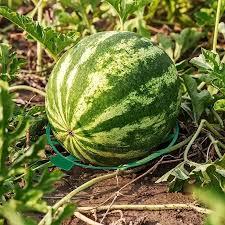
Hope you enjoyed the conversation on Monday Morning Mindfulness! As you may know, Watermelon is one of the best melons on the planet you can eat. Why? Because it's a HEALING FRUIT. You can live off this fruit for days with nothing else. But don't believe me, believe what you find when you do your own research!
Origin and emergence of the sweet dessert watermelon, Citrullus lanatus
Harry S. Paris*
Author information Article notes Copyright and License information PMC Disclaimer
Go to:
Abstract
Background and Aims Watermelons, Citrullus species (Cucurbitaceae), are native to Africa and have been cultivated since ancient times. The fruit flesh of wild watermelons is watery, but typically hard-textured, pale-coloured and bland or bitter. The familiar sweet dessert watermelons, C. lanatus, featuring non-bitter, tender, well-coloured flesh, have a narrow genetic base, suggesting that they originated from a series of selection events in a single ancestral population. The objective of the present investigation was to determine where dessert watermelons originated and the time frame during which sweet dessert watermelons emerged.
Key Findings Archaeological remains of watermelons, mostly seeds, that date from 5000 years ago have been found in northeastern Africa. An image of a large, striped, oblong fruit on a tray has been found in an Egyptian tomb that dates to at least 4000 years ago. The Greek word pepon, Latin pepo and Hebrew avattiah of the first centuries ce were used for the same large, thick-rinded, wet fruit which, evidently, was the watermelon. Hebrew literature from the end of the second century ce and Latin literature from the beginning of the sixth century ce present watermelons together with three sweet fruits: figs, table grapes and pomegranates. Wild and primitive watermelons have been observed repeatedly in Sudan and neighbouring countries of northeastern Africa.
Conclusions The diverse evidence, combined, indicates that northeastern Africa is the centre of origin of the dessert watermelon, that watermelons were domesticated for water and food there over 4000 years ago, and that sweet dessert watermelons emerged in Mediterranean lands by approximately 2000 years ago. Next-generation ancient-DNA sequencing and state-of-the-art genomic analysis offer opportunities to rigorously assess the relationships among ancient and living wild and primitive watermelons from northeastern Africa, modern sweet dessert watermelons and other Citrullus taxa.
Keywords: Archaeobotany, citron watermelon, Citrullus lanatus, Cucurbitaceae, colocynth, crop history, dessert watermelon, egusi watermelon, evolution under domestication, fruit sweetness, talmudic cucurbits
Go to:
INTRODUCTION
Watermelons, Citrullus Schrad., are among the most widely grown vegetable crops in the warmer parts of the world (Maynard, 2001; Wehner et al., 2001; Wehner, 2008). Over 3 400 000 hectares are planted annually, with production exceeding 102 000 000 t (http://faostat.fao.org/site/339/default.aspx). Few food items are as refreshing and appreciated on hot summer days as chilled slices of watermelon.
Citrullus (2n = 2x = 22) is a xerophytic genus native to Africa (Whitaker and Davis, 1962; Robinson and Decker-Walters, 1997). Other cultivated members of the genus, besides the familiar sweet dessert watermelon, are the citron and egusi watermelons and the colocynth (Jeffrey, 2001). The sweet dessert watermelon, though, has considerably less DNA sequence polymorphism than the others (Maggs-Kölling et al., 2000; Levi et al., 2000, 2001; Dane et al., 2004, 2007; Hwang et al., 2011; Nimmakayala et al., 2014a, b), indicating that it originated from a single founder population. The progenitor of the sweet dessert watermelon has been widely believed to be the colocynth or the citron watermelon and, recently, genomic sequencing has fostered the suggestion that the progenitor is the egusi watermelon (Guo et al., 2013). Another widely held belief is that sweet watermelons first diffused to Europe via Moorish Spain somewhat prior to 961 ce, from the Indian subcontinent, facilitated by Islamic conquests (Watson, 1983). However, there is much evidence showing that the history of the sweet dessert watermelon matches none of the above beliefs concerning progenitor or geographic origin. My objective is to gather and assess this evidence, and trace the origin and emergence of the sweet dessert watermelon.
0 notes
Text
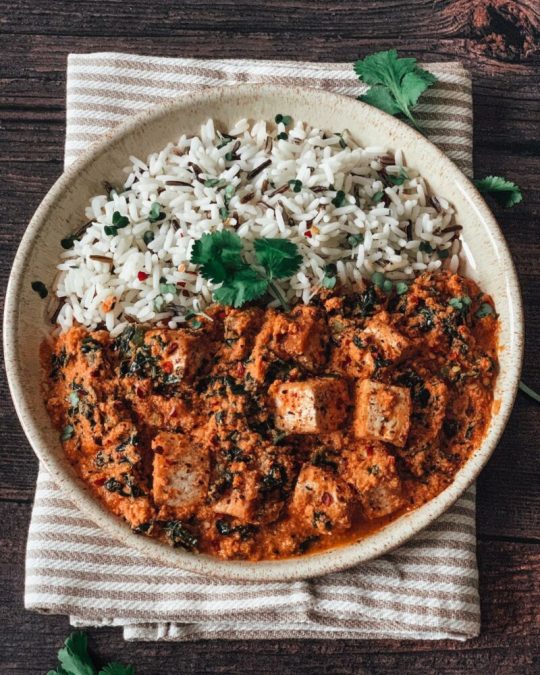
Nigerian-Inspired Vegan Egusi (Melon) Seed Stew with Tofu
#vegan#lunch#dinner#stews#nigerian cuisine#west african cuisine#african cuisine#tofu#egusi#tomatoes#red onion#spinach#ginger#bell peppers#chili#garlic#olive oil
34 notes
·
View notes
Text
https://www.ebay.co.uk/itm/204495027008?chn=ps&norover=1&mkevt=1&mkrid=710-153316-527457-8&mkcid=2&itemid=204495027008&targetid=4584619899083048&device=t&mktype=&googleloc=&poi=&campaignid=554609234&mkgroupid=1296325313557553&rlsatarget=pla-4584619899083048&abcId=9320693&merchantid=87779&msclkid=8eb4d6f17f6e1fc43e06b0e733ea7a28
Subjecthttps://i.ebayimg.com/images/g/8h4AAOSw8xpjOGm9/s-l1600.jpgRecipientTo ://www.ebay.co.uk/itm/314720230015?var=613236928255
Subjecthttps://www.fundmytravel.com/registerRecipientTo
0 notes